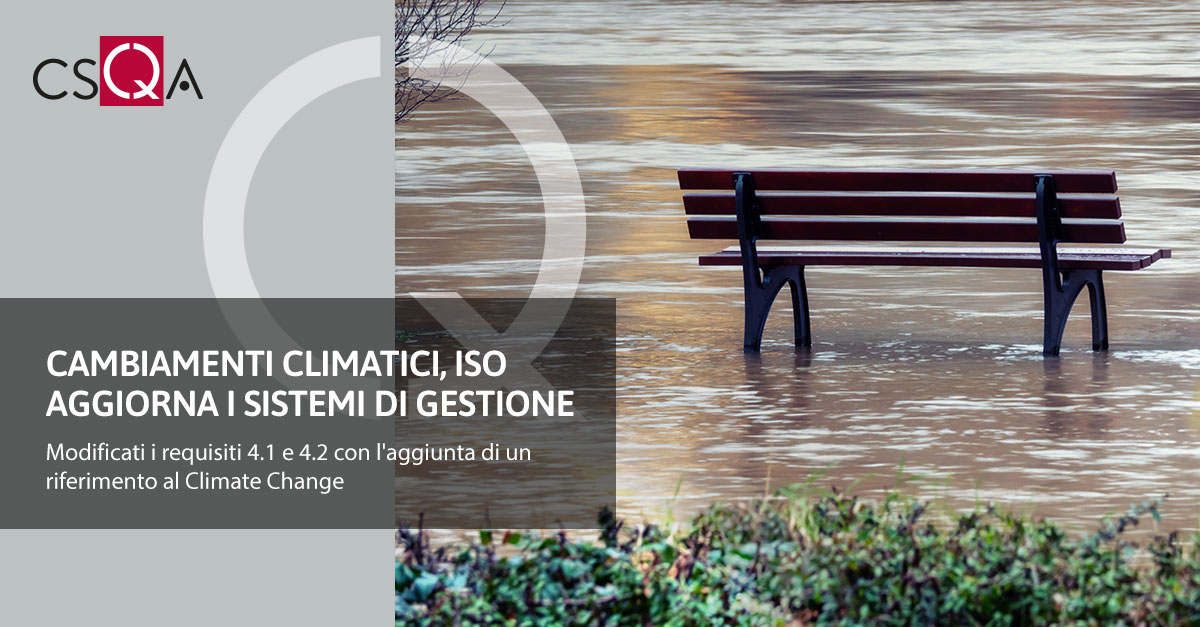 The International Organization for Standardization has published a revision of the Management Systems standards introducing specific references to the management of climate change by organizations.
The International Organization for Standardization has published a revision of the Management Systems standards introducing specific references to the management of climate change by organizations.
In particular, requirements 4.1 - Understanding the organization and its context and 4.2 - Understanding the needs and expectations of interested parties have been modified, with the addition of a reference to climate change as a factor to be evaluated for the analysis of the context and the expectations of interested parties.
Where an organization uses more than one management system (for example quality management and health and safety management), it should ensure that climate change, if deemed relevant, is considered within the scope of each standard of the management system.
It is important to specify that the year of publication of each standard will not change. Updates Section 4.1 of the new directives now requires organizations to explicitly understand and consider the risks and opportunities related to climate change when analyzing the business context:“The company needs to understand how relevant climate change factors can be.”.
This means that companies will need to carefully evaluate the impact their processes could have on climate change and plan accordingly, integrating sustainability into the heart of their business strategies. Similarly, point 4.2 highlights the importance of understanding stakeholders' needs and expectations in relation to climate change: “Relevant stakeholders may have climate change related needs”.
This implies that organizations must be sensitive to the requests and concerns of their stakeholders regarding environmental issues and possibly intervene to improve their practices and reduce environmental impact.
The list of specific rules to which the changes apply:
-
ISO 14298:2021 Graphic technology — Management of security printing processes I
-
SO 16000-40:2019 Indoor air — Part 40: Indoor air quality management system
-
ISO 22163:2023 Railway applications — Railway quality management system — ISO 9001:2015 and specific requirements for application in the railway sector
-
ISO 22301:2019 Security and resilience — Business continuity management systems — Requirements
-
ISO 28000:2022 Security and resilience — Security management systems — Requirements
-
ISO 29001:2020 Petroleum, petrochemical and natural gas industries — Sector-specific quality management systems — Requirements for product and service supply organizations
-
ISO 30301:2019 Information and documentation — Management systems for records — Requirements
-
ISO 34101-1:2019 Sustainable and traceable cocoa — Part 1: Requirements for cocoa sustainability management systems
-
ISO 35001:2019 Biorisk management for laboratories and other related organisations
-
ISO 37301:2021 Compliance management systems — Requirements with guidance for use
-
ISO 46001:2019 Water efficiency management systems — Requirements with guidance for use
-
ISO/IEC 27001:2022 Information security, cybersecurity and privacy protection — Information security management systems — Requirements
-
ISO 21401:2018 Tourism and related services — Sustainability management system for accommodation establishments — Requirements
-
ISO 30401:2018 Knowledge management systems — Requirements
-
ISO 50001:2018 Energy management systems — Requirements with guidance for use
-
ISO/IEC 20000- 1:2018 Information technology — Service management — Part 1: Service management system requirements
-
ISO 19443:2018 Quality management systems — Specific requirements for the application of ISO 9001:2015 by organizations in the supply chain of the nuclear energy sector supplying products and services important to nuclear safety (ITNS)
-
ISO/IEC 19770- 1:2017 Information technology — IT asset management — Part 1: IT asset management systems — Requirements
-
ISO 21001:2018 Educational organizations — Management systems for educational organizations — Requirements with guidance for use
-
ISO 37001:2016 Anti-bribery management systems — Requirements with guidance for use
-
ISO 41001:2018 Facility management — Management systems — Requirements with guidance for use
-
ISO 44001:2017 Collaborative business relationship management systems — Requirements and framework
-
ISO 14001:2015 Environmental management systems — Requirements with guidance for use
-
ISO 15378:2017 Primary packaging materials for medicinal products — Particular requirements for the application of ISO 9001:2015, with reference to good manufacturing practice (GMP)
-
ISO 18788:2015 Management system for private security operations — Requirements with guidance for use
-
ISO 21101:2014 Adventure tourism — Safety management systems — Requirements
-
ISO 22000:2018 Food safety management systems — Requirements for any organization in the food chain
-
ISO 37101:2016 Sustainable development in communities — Management system for sustainable development — Requirements with guidance for use
-
ISO 39001:2012 Road traffic safety (RTS) management systems — Requirements with guidance for use
-
ISO 45001:2018 Occupational health and safety management systems — Requirements with guidance for use
- ISO 9001:2015 Quality management systems — Requirement
The inclusion of these requirements relating to the fight against climate change from the analysis phase of the business environment strengthens the use of management systems as strategic tools for the sustainable transition.
This update not only highlights organisations' commitment to sustainability, but also helps them identify opportunities for innovation and growth within an increasingly sustainability-oriented economy.